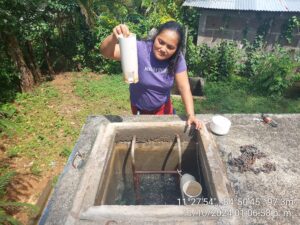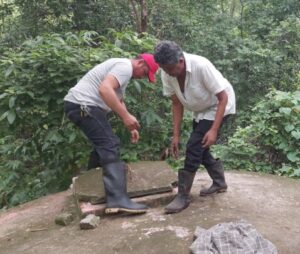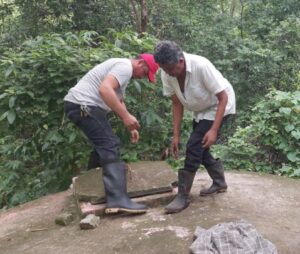Controlling Weeds with Rice Husks

Controlling weeds on farms is a very important activity that influences productivity. There are various methods of weed control including chemical, biological and mechanical methods, among others. The particular method a farmer selects would be determined by a factor including the effectiveness of controlling weed, the cost of the method, or other factors that may be specific to the individual farmer. Over the years, Self Help International’s agricultural extension specialists in Ghana have explored mulching as a means of weed control and soil water conservation.
Self Help International’s training center recently ran an experiment to test the effectiveness of mulching with rice husk. Rice husk was selected as the medium because it is generally available as a waste material from the processing of rice in some of its partner communities. The rice husk is left to waste or burned at the local rice mills after hulling because farmers do not see value in it, so Self Help International (SHI) sought to find an alternative use for this waste.
In February 2021, a pineapple plot was mulched with rice husks to about 1 inch high. In 2022, SHI did not apply any further means of weed control. It was observed that the rice husk is able to significantly suppress weed growth. The mulching also created a barrier between the weed seed and the soil which reduced the ability of the seeds to germinate. This is because fresh rice husk has a hard, slippery surface and does not hold moisture to support the sprouting of weed seeds. In addition, weed seeds that are mulched over cannot receive sunlight because it is blocked out by the mulch and thus won’t germinate. Consequently, until the rice husk is decomposed and broken down to the point where it will allow moisture and sunlight to pass through it, it will remain difficult for weed seeds to grow. Because rice husk decomposes very slowly on its own, it prevents weed seeds from growing on it for a long time.
However, when rice husk that is used as mulch eventually decomposes, it is able to conserve soil moisture for long periods and protect the soil from direct sunlight. This creates an ideal environment for soil-living organisms and decomposers such as earthworms, slugs, sow bugs and beneficial insects, bacteria and fungi to thrive. The activities of these organisms in the soil ensure complete decomposition of the mulch and promote soil health, hence they are deemed beneficial to agriculture.
SHI’s Agriculture and Entrepreneurial Program is sharing these findings and results with rural farmers. The team is now training and advocating the use of rice husk as an effective mulching material. Some partner farmers have started practicing this mulching and weed control method and are seeing positive results.
In the face of rising costs of inputs, SHI is pleased to share this information about a low-cost and widely available solution to improved mulching and weed control with farmers.




